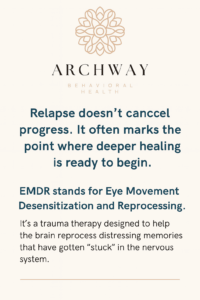“I Thought I Was Past This.”
Relapse isn’t always dramatic. Sometimes it’s quiet. A slow drift. A moment you don’t see coming until you’re already there. And when you’ve had time—90 days, a year, more—the fall can feel heavier.
You start to question everything. Did I learn anything? What’s wrong with me? Why did this happen again?
If that’s where you are, take a breath. You’re not broken. You’re not starting over. You might just be ready to heal what couldn’t be touched the first time around.
That’s where EMDR therapy comes in.
Relapse Isn’t the End—It’s a Signpost
At Archway Behavioral Health in Boca Raton, we remind returning clients of one thing: relapse doesn’t cancel progress. It often marks the point where deeper healing is ready to begin.
For many people, relapse surfaces old wounds that were never fully resolved. Pain that was managed through sobriety—but never metabolized. That’s where trauma therapy becomes more than helpful. It becomes essential.
What Is EMDR Therapy, Really?
EMDR stands for Eye Movement Desensitization and Reprocessing. It’s a trauma therapy designed to help the brain reprocess distressing memories that have gotten “stuck” in the nervous system.
In simple terms, EMDR helps your brain finish what trauma interrupted.
Using bilateral stimulation (like eye movements or tapping), EMDR allows you to revisit painful memories without reliving them. Over time, the emotional intensity tied to those memories fades—and you gain new clarity, calm, and freedom from reactivity.
It’s less about explaining your pain and more about resolving it.
Why EMDR Makes Sense After Relapse
In early recovery, you’re focused on stabilization—breaking the cycle, establishing routines, building support. That work matters.
But once the surface calms, deeper patterns can emerge. You might:
- Start avoiding people or places that remind you of old pain
- React strongly to “small” things and not know why
- Feel emotionally numb or disconnected
- Notice the return of old shame or self-loathing
- Struggle to explain why sobriety feels harder than expected
These aren’t character flaws. They’re symptoms of unresolved trauma.
EMDR therapy helps address those roots—so you’re not fighting the same internal battles with the same exhausted tools.
A Real Story from a Returning Client
We had a client—let’s call her M.—who came back to Archway after a short relapse. She’d been sober for nearly a year before slipping into old patterns after a family visit.
She wasn’t confused about what happened. She knew the trigger. But knowing didn’t stop the spiral. She felt angry with herself. She kept saying, “I thought I was done with this.”
During EMDR sessions, M. began processing the emotional freeze she experienced as a child when her dad drank. Not a single, catastrophic event—just years of walking on eggshells. Always bracing.
By working through those early memories with EMDR, M. found she could stay emotionally present in difficult situations. Her body stopped assuming every stressor was a threat.
That shift didn’t just keep her sober—it made sobriety feel sustainable.
EMDR Therapy Isn’t About Rehashing Everything
If the idea of diving into trauma feels overwhelming, know this: EMDR is not about “digging it all up.”
It’s structured. Contained. You control the pace. And you don’t have to share every detail for it to work.
At Archway, our trauma-trained clinicians will walk with you every step of the way. Whether you’ve been to treatment before or are returning after time away, we’ll meet you with respect and readiness—not judgment.
Looking for EMDR Therapy Near You?
If you’re based in Delray Beach, Coral Springs, or Deerfield Beach, Florida, our Boca Raton center offers trauma-focused therapy tailored to returning clients.
Looking for EMDR therapy in Coral Springs, Florida? Archway Behavioral Health provides compassionate, evidence-based care just minutes away.
FAQ: EMDR Therapy for Alumni in Recovery
Can I do EMDR if I’ve recently relapsed?
Yes. You’ll first stabilize with the support of our clinical team. Once you’re grounded, we’ll help determine when EMDR is appropriate and safe to begin.
Do I need to remember everything for EMDR to work?
No. You don’t need perfect recall or vivid details. EMDR works even with fragments or emotions that feel disconnected from clear memories.
Will EMDR make me feel worse before I feel better?
Some emotional discomfort can come up, especially in early sessions. But your therapist will help you stay regulated, grounded, and in control throughout.
How is EMDR different from traditional talk therapy?
Talk therapy helps you explore and understand. EMDR helps your body and brain reprocess trauma that keeps looping, even when you “get it” intellectually.
Can EMDR be part of an outpatient or aftercare plan?
Absolutely. EMDR works well alongside IOP, alumni support groups, and 12-step involvement. It complements—not replaces—your broader recovery structure.
You’re Not Back at Square One. You’re Standing on Everything You’ve Already Learned.
Returning to treatment isn’t failure. It’s growth. It’s choosing to get curious instead of giving up.
EMDR isn’t about erasing your past. It’s about loosening its grip—so you can stay present, grounded, and free.
If you’ve relapsed, you haven’t ruined your story. You’ve just uncovered a chapter that’s asking for more care.
And we’d be honored to help you write the next one.
Ready to Try a New Kind of Healing?
Call (888) 530-0227 to learn more about our EMDR therapy services in Boca Raton, Florida.



